Panels and Presentations for The Keys to Democracy
This blog is updated with the public presentations of The Keys to Democracy: Sortition as a New Model for Citizen Power, by my late father Maurice Pope. Endorsements and reviews can be found separately here. A fine hardback is available direct from Imprint Academic (where you can get a 30 per cent launch discount with code CAT23, but beware of Brexit charges if ordering to Europe!). Globally it’s on Amazon (e.g. US, UK, DE) as a hardback and as Kindle. The publisher also posted my Dad’s preface online here.
+++
4 June 2023 – FDRH Podcast with Michael Goldfarb

The eloquent American radio reporter and podcaster Michael Goldfarb and I had a fun and thoughtful conversation about democracy by lot and my late father Maurice Pope’s new book ‘The Keys to Democracy: Sortition as a New Model for Citizen Power’. (Also on SoundCloud here).
Goldfarb reported from around the world for National Public Radio, so our discussion on his First Rough Draft of History (FRDH) podcast ranged far and wide, even taking in the Turkish elections. I was happy that the veteran newsman, now living in London, appeared to like the book as well.
“Not a bad stylist, your Dad. Not a bad writer at all,” he hummed, reflecting what, in his adopted English home, could be quite strong expression of approval.
+++
27 June 2023 – Engines of Oligarchy: Podcast with Australian economist Nicholas Gruen
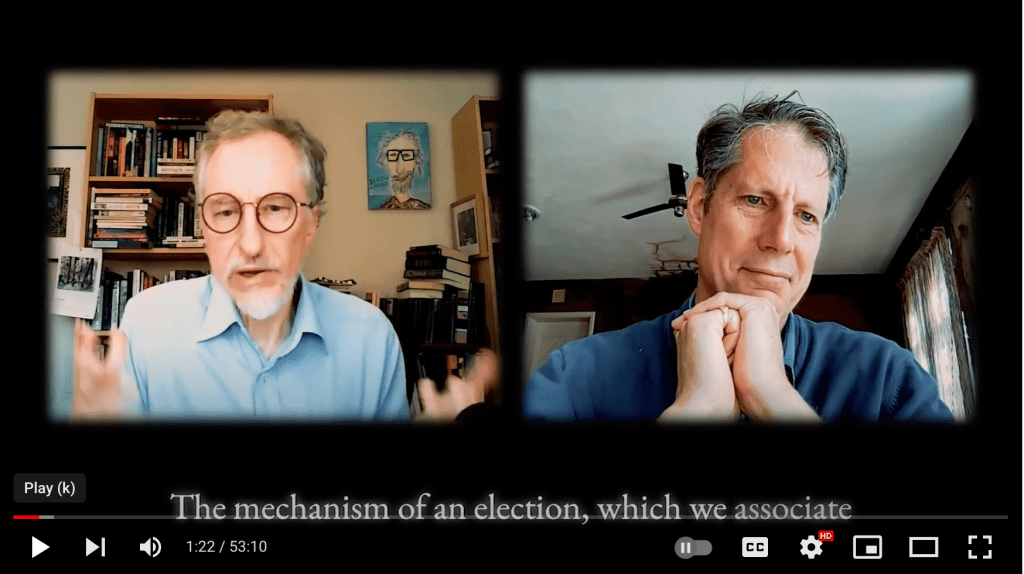
This is a full podcast with Nicholas Gruen – on YouTube here – but our full conversation was a lot longer and has been well-edited to capture all the best parts that make up a good introduction to the benefits of sortition. The sound and video are strikingly good too, considering that I was talking from the end of a very long, thin copper cable while supervising roof work at my Turkish mountainside home-from-home. We cover a lot of ground about elections, sortition, my late Dad’s book and we even had some fun along the way.
+++
24 May 2023 – Video of the book launch debate
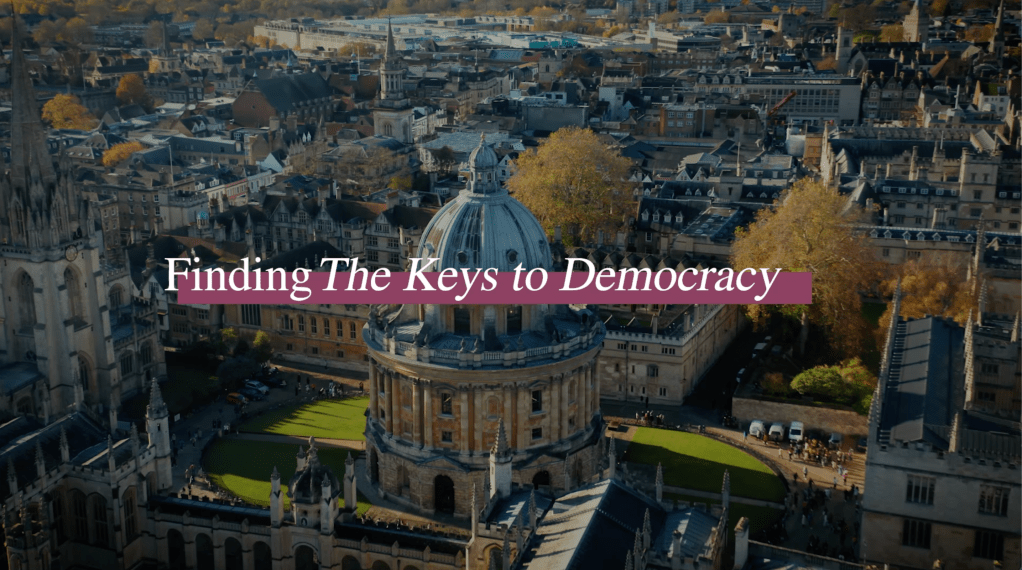
“Fantastic.” “Visionary.” “Extraordinarily radical.” “It’s a brilliant book.”
This short video highlights the uplifting comments and buzzing spirit we had at the launch in Oxford of The Keys to Democracy: sortition as a new model for citizen power, my late Dad Maurice Pope’s long-lost work on how to understand and fix our dysfunctional, 250-year-old political system. To mark the occasion, more than 70 members of his family, friends and similarly minded enthusiasts for democratic innovation gathered on 18 March 2023 for a debate in Wadham College.
+++
18 April 2023 – Online panel with Germany’s Mehr Demokratie

Much to consider in this YouTube recording of our wide-ranging debate on 18 April organised by Germany’s big national democracy innovation NGO Mehr Demokratie about when and how randomly selected citizens’ assemblies may gain more decision-making power.
For the discussion, Mehr Demokratie’s Ina Poppelreuter hosted Polish sortition expert Marcin Gerwin, Mehr Demokratie’s Board Member Sarah Händel and me.
While there was mention of legally binding powers in some countries and in some domains already today, most interventions were in favour of step-by-step gradualism and more experimentation. Still, it was clear that most of us thought that some citizens’ assemblies are already gaining much legitimacy and credibility, and that politicians will have increasing difficulty to ignore their recommendations.

+++
21 March 2023 – Online panel organised by DemocracyNext

A first online discussion of The Keys to Democracy – alongside Professor Yves Sintomer, whose excellent new history of sortition The Government of Chance was published in February – was hosted on 21 March 2023 by Claudia Chwalisz of DemocracyNext and moderated by James Harding of Tortoise Media. Click here for a Twitter thread with key take-aways and more pictures.
+++
18 March 2023 – Wadham College, Oxford

We had a full house and a lively debate on Saturday 18 March 2023 at Oxford’s Wadham College to launch my late father Maurice Pope’s book The Keys to Democracy: Sortition as a New Model for Citizen Power. A short video of the event is here.
I told our audience of 70 friends, family and democratic innovation enthusiasts how my father conceived and wrote the work in the 1980s, why it didn’t find a publisher three decades ago and what happened after we found the typescript after his death in 2019, forgotten on an obscure shelf in his large library.
I also laid out how The Keys to Democracy challenges us to define democracy more honestly: that is, to convince proponents of our current system that elections are not the be-all and end-all of democracy. In fact, my late Dad’s book argues that elections visibly do little more than shuffle chairs within an oligarchy, proving that “a ruling class does not need a ruling committee”. The alternative is sortition, he says, the system that powered the success of a civilisation like ancient Athens: replacing elite party politicians with the random selection of citizen panels that set policy through informing themselves, deliberating and reaching consensus, not forcing things through on narrow majority votes.

My old Wadham College roommate Michael Potter, now Cambridge’s Professor of Logic, responded to my enthusiasm by pointing out some challenges ahead. For instance, he questioned how a court jury can really be transformed so easily, as my late father proposes, into a policy-making panel. Michael’s intervention was informed by many conversations with my late father about the mathematics of sampling and random selection.
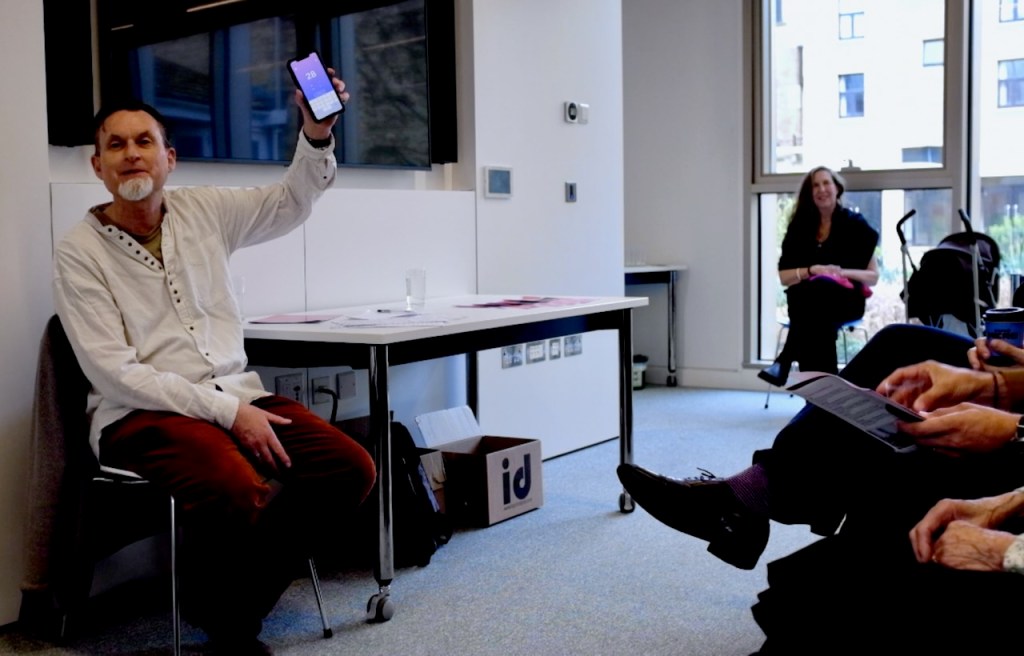
Richard Pantlin of Oxford’s Citizens Assembly Network moderated our debate, mixing it up with some instructive fun. Rich recreated the buzz of deliberation in a citizens’ assembly by asking guests to discuss their views with neighbours. Then he gave a taste of random selection by using lottery tickets to choose who got to ask questions from the audience. As ever, using random selection gave everyone a taste of having an equal chance.

We also had the chance to listen to two other Oxford activists. Dr Al Chisholm added a practical note, describing how a Citizens Jury brought very different people onto the same page about travel within Oxford. Dr Rabhya Dewshi explained why Extinction Rebellion supported citizens’ assemblies as part of XR’s goal to #decidetogether.
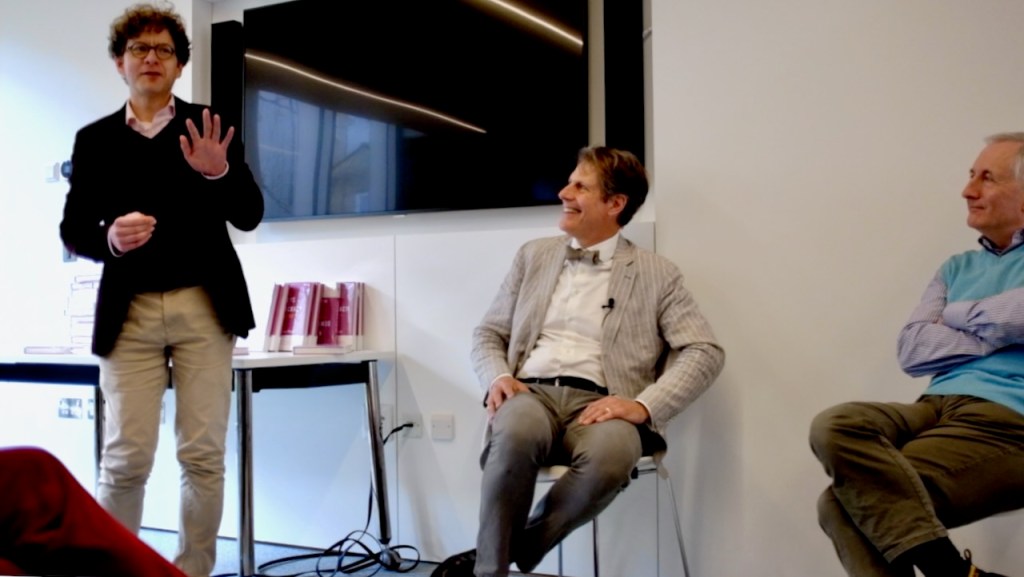
We were honoured to have University College London’s Professor Alan Renwick in the audience. He rose to tell us about a citizens’ assembly that he led in 2017, in which the randomly selected citizens made consensual proposals that might have defused the post-Brexit crisis. For instance, they showed that informed citizens supported the UK staying within the EU customs union and single market. If only such an assembly had had the chance to debate EU membership before the referendum vote!
Pioneer Olly Dowlen, who wrote his book on the political potential of sortition more than two decades ago, told the audience about how sortition produces good decisions.
I was amazed to hear, just ten days after publication, that several people had already ordered and read the book. My proudest moment for my father at the event was when one top practitioner said he had bought and almost finished The Keys to Democracy already and found it an “astonishingly brilliant book. It thinks through many of the things that political theorists and political scientists have been gradually groping towards over the last 40 years.”
+++
13 March 2023 – Leiden University, the Netherlands
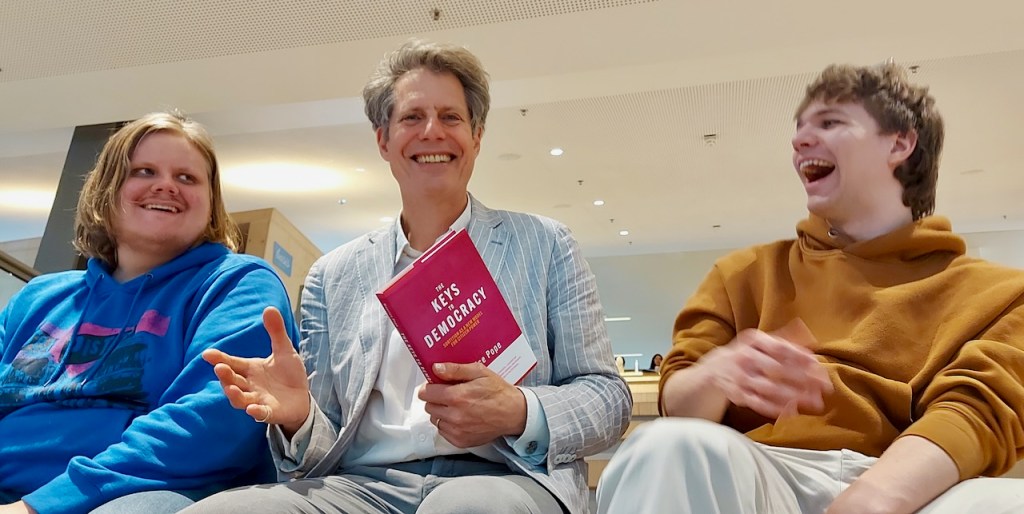
A light moment after a first book talk for The Keys to Democracy on 13 March 2023, for faculty and students at Leiden University’s Institute for Security and Global Affairs in The Hague, the Netherlands.
+++
1 March 2023 – Democracy Nerd podcast, Portland OR

The irrepressible Jefferson Smith and I left no stone unturned in my first podcast on 1 March 2023 in support of my late Dad’s book The Keys to Democracy: Sortition as a New Model for Citizen Power.
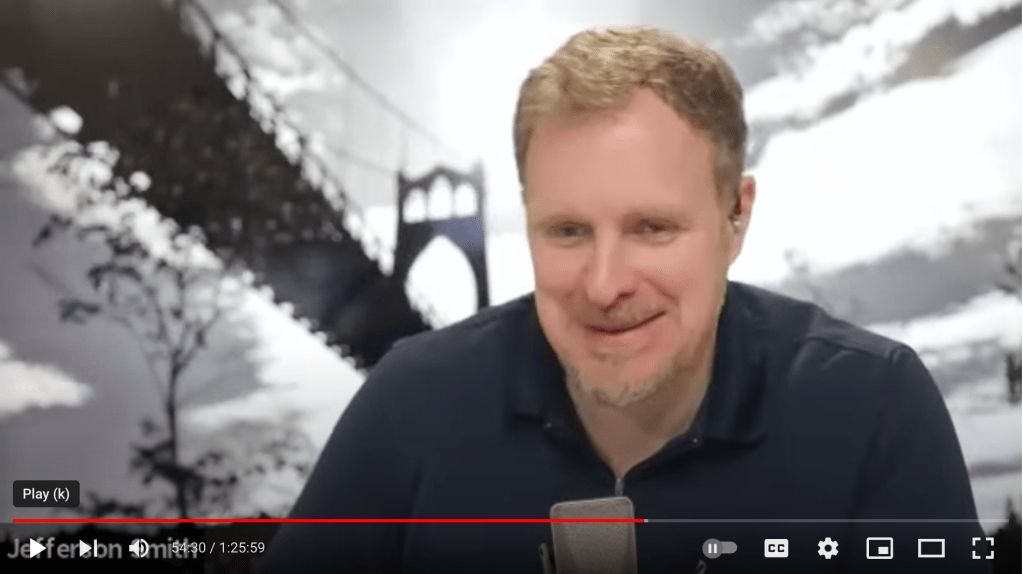
Starting with the impact of the earthquake in Turkey (where I happened to be), Smith and his podcast Democracy Nerd took us on an unstoppable and surprisingly fun romp through not just the philosophy of democracy (including testing questions on Plato’s noumenalism), my father’s work in South Africa, the lonely life of an independent academic, the things sons do & don’t learn from their fathers and what it’s like to attend a citizens’ assembly.
Along the way we did of course explore the ins and outs of random selection, deliberation and the possible uses of democracy by lot. It was midnight, we kept debating for more than 90 minutes, I was freezing by the end and I had no idea that the camera recording was going to be published on YouTube! So it was not my slickest look.

-
May 4, 2023 at 4:29 pmPraise for Maurice Pope’s The Keys to Democracy | Hugh Pope